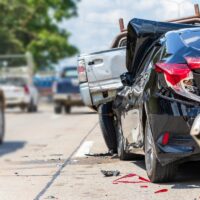Preventing Chain Reaction Car Accidents

The moments just after a car accident can be even more frightening than the initial collision, especially if the accident occurred on a heavily trafficked freeway. Tractor-trailer trucks (or 18-wheelers) are very often involved in chain-reaction crashes. Should you find yourself in a multi-car pileup, your chances of suffering catastrophic injury are multiplied. Below, we discuss chain-reaction car accidents and how they can be avoided. For help after a serious car crash in Dallas, call a dedicated Texas car accident attorney for assistance.
What is a Chain Reaction Car Accident?
A chain-reaction car accident refers to situations in which three or more vehicles hit one another in a series of rear-end crashes. Typically, the series will involve the front car (Car A) stopping unexpectedly for some reason, a second car (Car B) crashing into the rear of Car A, and then a third car (Car C) crashing into the rear end of Car B, creating a “chain reaction” of traffic accidents. More vehicles may become involved, especially if the accident occurs on a busy freeway.
Chain reaction car accidents or pileups can also start from the rear and continue forward. In the above example, the impact of Car B or Car C’s crash may propel Car A into a different car in front of Car A, creating another chain reaction of rear-end collisions. Some vehicles may even be thrust sideways into adjacent lanes of traffic, raising the possibility of additional collisions from both directions.
Almost always because of the heavy weight and high speed of 18-wheelers, these truck tractors are capable of inflicting very serious injury or death when they are involved in a chain-reaction crash.
How Can You Prevent Chain Reaction Car Accidents?
There are a number of factors that play into whether a chain-reaction car crash will result from a given driver’s actions. Typically, chain-reaction car crashes occur when cars are driving too close to one another on the freeway or otherwise at high speeds, especially when there is rain or fog to cloud vision as well as wet or icy roads to inhibit the effectiveness of brakes. Drivers who text while driving or otherwise operate while distracted are more likely to cause a rear-end collision, which can lead to a chain reaction accident depending upon the circumstances.
Preventing chain-reaction car crashes is a matter of being safe and considerate while on the road, including:
- Remain attentive, especially by avoiding texting or other phone use
- Give the vehicle in front of you sufficient space so that you have time to slam your brakes before the collision, should they suddenly stop (i.e., avoid tailgating)
- Provide additional room for error if there are inclement road conditions
- Keep an eye on vehicles around you, including by periodically checking your blind spots
- Avoid speeding
- Drive more slowly when visibility is limited
- If you are involved in a crash, put on your hazard lights
If you were involved in a chain reaction accident, it can be difficult to establish who was ultimately at fault. There might even be multiple negligent parties. You may need eyewitness testimony, police reports, forensic experts, traffic camera footage, and all types of additional evidence to properly reconstruct the accident. A savvy car accident lawyer can help investigate the circumstances of your crash to determine who may be liable.
If you or a family member has been injured or killed in a Texas car accident, please contact the Turley Law Firm online or call 214-691-4025 or email turley@wturley.com today to schedule your free consultation. Our professional Dallas attorneys serve clients throughout Texas and multiple Southern and Southwestern states.
